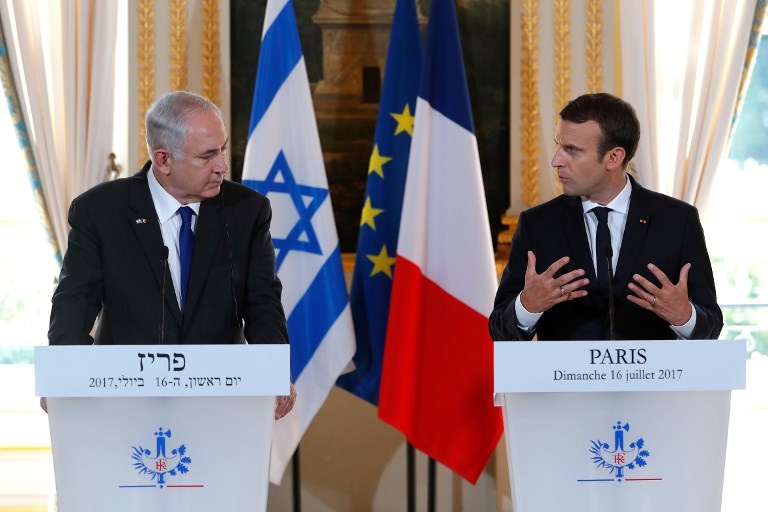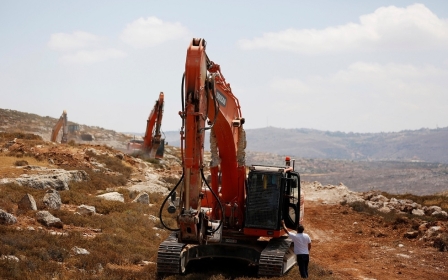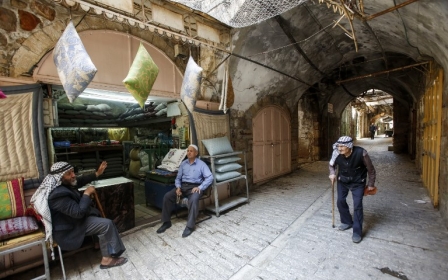Macron slams Netanyahu on illegal settlement policy

Emmanuel Macron told Israel's Benjamin Netanyahu on Sunday that Paris opposes Israel's expansion of settlements in occupied Palestinian territory as he urged fresh Middle East peace talks.
Stressing that international law should be "respected by all", the French president told the Israeli prime minister, including the "continued building" in occupied Palestinian territory.
Israelis and Palestinians should be able "to live side by side within secure and recognised borders with Jerusalem as the capital," Macron said after his first official talks with Netanyahu.
"I hope everything will be done for negotiations to move forward," he said.
Talks between Israel and the Palestinians have been at a standstill since the failure of US mediation in the spring of 2014.
Macron, elected in May, appears to be following the proactive line taken by his Socialist predecessor Francois Hollande, whose efforts to mobilise the international community on the peace process angered Israel.
The French leader met Palestinian leader Mahmoud Abbas on Wednesday, when he said he backed a two-state solution and opposed Israeli settlements.
"France has always condemned the continuation of settlement building, which is illegal under international law and has reached an unprecedented level since the beginning of the year," he said in his first public remarks on the conflict since taking office.
The United Nations reported in June that Israel had announced a substantial increase in settlements in the past three months in spite of a UN resolution demanding a halt to the Jewish outposts.
Earlier Sunday, Macron and Netanyahu underscored their two countries' longstanding friendship as they marked the 75th anniversary of a notorious 1942 roundup of 13,000 Jews to be sent to Nazi death camps.
Netanyahu was the first Israeli prime minister to attend a Vel d'Hiv commemoration, and he said the invitation was a "very, very strong gesture".
Macron addressed Netanyahu as "dear Bibi" and called "anti-Zionism" a new form of anti-Semitism.
Netanyahu's presence at the event drew fire from some groups, notably the Union of French Jews for Peace, which accused the Israeli government of "usurping the memory of the victims of Nazism to make people believe that Israel represents all the world's Jews".
During their talks afterwards, Macron assured Netanyahu of his "vigilance" regarding the 2015 nuclear accord reached by Western powers with Israel's arch-enemy Iran.
Netanyahu was a vocal opponent of the deal, which saw sanctions against Iran eased in return for curbs on its nuclear programme.
The French presidency said Sunday's meeting would be an occasion to "signal our lack of complacency towards Iran".
Israel opposes Syria ceasefire
Netanyahu told reporters after his meeting with Macron that Israel opposes the ceasefire agreement in southern Syria that the United States and Russia reached because it perpetuates Iranian presence in the country, Haaretz reported.
A senior Israeli official who asked not to be identified because of the diplomatic sensitivity of the matter, told Haaretz that Israel is aware of Iranian intentions to substantially expand its presence in Syria.
Iran is not only interested in sending advisers to Syria, the official said, but also in dispatching extensive military forces including the establishment of an airbase for Iranian aircraft and a naval base for Iran's navy.
"This already changes the picture in the region from what it has been up to now," the senior official said.
Since taking office, Macron has drawn praise for his balanced but firm handling of encounters with world leaders such as US President Donald Trump and Vladimir Putin.
Macron rolled out the red carpet for Trump on Friday when he was guest of honour for France's Bastille Day festivities.
The French leader criticised Trump over his renunciation of the Paris climate accord, but he stressed their close cooperation against the Islamic State group in Syria and Iraq.
Similarly with Putin, whom Macron hosted at the sumptuous Versailles palace in May, the French leader stood firm on French opposition to Russia's annexation of Crimea in 2014.
But he said the removal of Syrian President Bashar al-Assad - Moscow's chief ally in the Middle East - was not a prerequisite to a solution to the six-year-old conflict in Syria.
Middle East Eye propose une couverture et une analyse indépendantes et incomparables du Moyen-Orient, de l’Afrique du Nord et d’autres régions du monde. Pour en savoir plus sur la reprise de ce contenu et les frais qui s’appliquent, veuillez remplir ce formulaire [en anglais]. Pour en savoir plus sur MEE, cliquez ici [en anglais].




